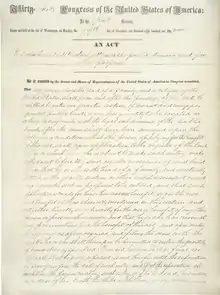Homestead Act of 1860
The Homestead Act of 1860 in the United States would have made land available for 25 cents per acre. This act was passed by the United States Congress, but was ultimately vetoed by President James Buchanan.[1] The late 19th century and early 20th century were a time of violent conflict over land use in the American West. The Johnson County War in Wyoming was one of the worst episodes in the saga.

Proponents
This was at a time where northerners had an idea that the government should give 160-acre (0.65 km2; 0.25 sq mi) plots of land to pioneers for free. People went to the west to start new lives and for the cheap land.
Opposition
There was much worry with the free land idea. The southerners, who were still pro-slavery, worried that this would result in the west becoming populated with free-soilers. This in turn would create many anti-slavery states, creating an imbalance in the Senate against the South. Another group who opposed this idea was the Eastern industrialists. They feared employees would be drained into the West for free land.